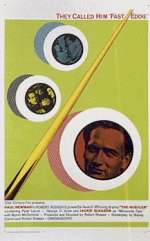What're You Reading Then? | |
 | I don't like Nick Hornby, or his books. His books, however, are occasionally so close to being great that it is heart-warming to be able to seize on passages where you can point the finger, titter and jeer. I guess it is rather like Supergrass or Fatboy Slim. You may unwittingly find yourself singing one of their songs while you are hosing yourself down, so it is reassuring to be able to sneer at their risible media collaborations and say; "this is what they are like…" So, Nick Hornby's books. I'm not an authority, and I could be wrong, but in Fever Pitch doesn't he refer to Steve McQueen being Fast Eddie in The Hustler, and in High Fidelity doesn't he have a shabby gothic rocker type talking about Fire Engines? I mean, come on! Do me a favour… In my eternal quest for inspiration and information (also known colloquially as killing time) I was flicking through a music periodical and chanced upon a couple of brief pieces on David Henderson of the Nectarine No. 9. In one he was talking about his first pop group and how they became Fire engines, inspired by The Fall and James White and The Blacks (or their altered egos, James White and The Contortions). In the other he was talking about a Nectarine No. 9 song called 'Walter Trevis'. You should never assume anything, so I should mention a couple of things here. |
 | Firstly, Davey H was the lead singer/guitarist in Fire Engines, possibly conceptually the singularly most striking pop group of the early '80s. They were extreme. They played extremely short sets. They looked great and made a hell of a racket, but created great pop hooks. They stretched the limits of pop, but the politics of pop got the better of them. Revola put out a CD in '93, Fond, which tells you all you need to know. 1993 also saw Davey back at his beginnings, scratching around at pop's outer limits rather like his mentor, Vic Godard, and he has been doing some very useful scratching without too much emphasis on the 'I could have been a contender' angle. Anyway, secondly, the idea of writing a song about or for Walter Trevis is a good one. Trevis wrote, of course, The Hustler (and its sequel, The Color Of Money) and The Man Who Fell To Earth, and Davey H is correctly spinning the story that while these stories seem so different, they are very much part of the same thing. Naturally, because life's like that, reading the Davey Henderson pieces coincided with me reading Walter Trevis' The Hustler in its very smart new Bloomsbury Film Classics edition, The Hustler being my then current ride to work read. This week, it's the Harvill Panther edition of Raymond Carver's collection, What We Talk About When We Talk About Love. I love sitting on the train to work watching what people are reading. Train companies get enough criticism, but why does no one ever commend the contribution to literacy and the new book boom? You get stuck at a signal, and it's more time to turn pages. It really does fascinate me to see what people are reading, and I have often fallen out of love with beat angels who suddenly produce an Alex Garland, Irvine Welsh or John Grisham tome when sitting across the aisle just as you have been convinced they would be more your Graham Greene or Douglas Coupland type of girl. I have no doubt that visitors to this site think that I am the man John Miles sang those words about, but I have other loves. I would guess, if you worked it out, that I spend more time reading books than listening to records, and waste more time in bookshops than record shops. Mind you, that has a bit to do with there being no record shops of note near where I work and there being a great discount book store near where I work. I don't know where you live, but one of the better features of London life is the network of bargain bookstores, with two in the Charing Cross road at least, and the Original Soho Bookstore and another by The Cut, just for starters. I am not a great collector of books, and tend to recycle them unless they are too special, but I do regularly buy reduced titles for my journeys to work. It is, therefore, always a pleasure to see some of my favourite imprints on the shelves for under £3 (the less the merrier): Bloomsbury, Harvill, Serpent's Tail, Granta. Particularly worth looking out for from these publishing houses have been special series such as Bloomsbury's Film Classics and Serpent's Tail's (Mask Noir) Midnight Classics. The former series, naturally, features the Walter Trevis titles The Hustler and The Man Who Fell To Earth. The real joyous discovery, however, has been Harry Grey's Once Upon A Time In America (originally published in 1953 as The Hoods), which is a sweeping Jewish gangster epic even more moving than Morricone's movie score. |
 | The Serpent's Tail Midnight Classics series is of interest particular for the Horace McCoy titles. I am sure Marino could tell you more about the films inspired by They Shoot Horses, Don't They? and Kiss Tomorrow Goodbye, but I want to mention No Pockets In A Shroud which is one of those very tough, very moral tales of the '30s where the writer shies away from being overtly pro-communists/socialists but implies that if being a Red is tackling corruption and its ramifications, then yeah, we'll stick up for what's right and if you want to call us Reds, we'll be Reds, and we'll fight on our own terms. It's a great noir device, employed for example elsewhere by Dashiel Hammett in Red Harvest and Ross Mac Donald in Blue City, and it's something I will always fall for. Do you remember Wah!'s 'Story Of The Blues'? I love that song. It's as corny as hell, but totally involving and moving. Like Grapes of Wrath and in particular the film version with the Henry Fonda speech at the end. At least, I think it was Henry Fonda. I could be doing a Nick Hornby here, which is a worrying thought. One other book I would like to mention from Bloomsbury is Joyce Carol Oates' On Boxing, which is an extraordinary little title. Joyce wrote one of my favourite books, the girl gang fuelled Foxfire, and I would certainly recommend the boxing text that restores some of the glamour and artistry to the tarnished sport's name. Basically, it's a collection of essays written by Joyce in the late '80s, and they show a remarkable awareness of and insight into the purpose and possibilities of boxing. It would be interesting to know what she makes of all the things that have happened in boxing in the '90s, and in particular it is hard to recognise the Mike Tyson she writes about, but she seems to predict the trouble he will have as an outlaw or outsider unprotected like other establishment approved black boxers. Whatever you may think of boxing, this is a poetic, provoking book, and one that could only have been written by a true fan. Take part of her (new 1994) foreword: "Occasionally there is a boxing match that, in its demonstration of skill, courage, intelligence, hope, seems to redeem the sport - or almost." For boxing, you could substitute pop, and that could have been about the last Clinic single. As Joyce states, many have tried to cover boxing in the arts, and for me Budd Schulberg springs immediately to mind, with The Harder They Fall and On The Waterfront. The latter of course with its oft cited "I could have been someone. I could have been a contender." |
 | I guess that brings us back to Davey Henderson who should have taken all comers once and for all but took a fall through bad advice. Still, I kind of like him where he is now, struggling with the demons of his (Win) past, like Matt Scudder in Lawrence Block's superb private eye harder boiled than anyone ever series. Have I mentioned Lawrence Block yet? © Kevin Pearce 1999 |